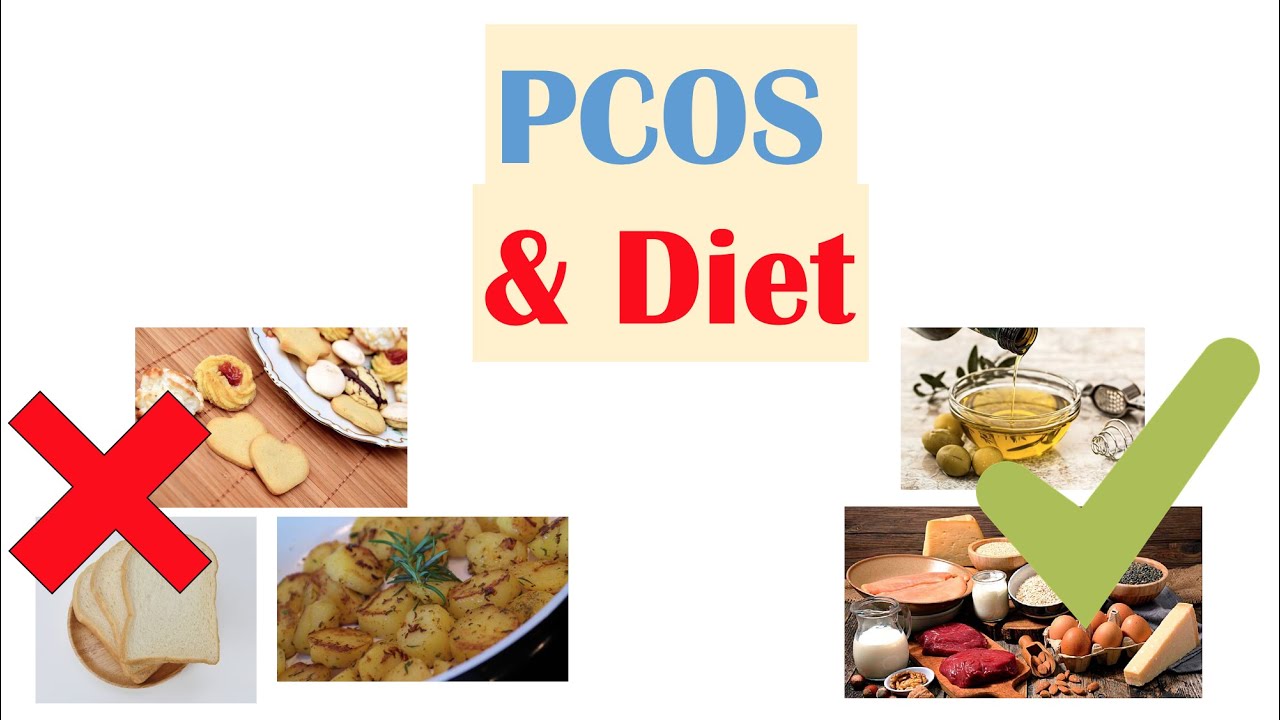PCOS Diet Plan: What to Eat & What to Avoid
PCOS Diet Plan: What to Eat & What to Avoid – Polycystic Ovary Syndrome (PCOS) is a usual hormonal disorder that affects people throughout their reproductive years. It is visible with misshapen periods, enhanced androgen levels, and the improvement of small cysts on the ovaries. If not talked about it, PCOS can lead to serious health problems like diabetes, cardiovascular, and infertility issues. Thus, managing PCOS is important for overall well-being. This blog digs into PCOS Diet Plan: What to Eat & What to Avoid or why talking about PCOS is important and zooms on the main role that diet plays by providing practical insights into advantageous food choices to make and avoid to manage the situation with your dietary choices successfully.
People in this situation also are at improved risk of heart disease, obesity, and diabetes. However exercise a healthy diet, and good sleep can help decrease symptoms and control the bad effects of PCOS.

Health optimization in people with PCOS is diplomatic to a lot of things — specifically, the things we eat and drink, our sleeping and wake-up cycle, and physical activity. Begin with a balanced diet of full, fresh foods as much as viable and limit prepared foods. And put that diet into the context of your circadian rhythms (your sleeping and wake-up cycle). This means eating when you are having the most activity because that is when your body requires energy and can burn off extra blood sugar. This approach will support you in managing your blood glucose, which affects androgen and insulin levels. Moreover, that can mean some PCOS symptoms and long-term health problems. Now let us talk about the PCOS Diet Plan: What to Eat & What to Avoid.
Great foods for PCOS
A maintained and full-nutrition food diet is crucial for maintaining Polycystic Ovary Syndrome (PCOS). However, including particular food lists can lead to better hormonal management and overall well-being. Let us dive into a range of foods that are friendly with PCOS, categorized to advise you in making good dietary choices.
- Pulses for Plant-Based Protein – Variegate your protein origins with pulses like lentils, chickpeas, beans, and split peas. These peas pack a protein punch while providing iron and folate, necessary nutrients that lead to overall health for particulars managing PCOS.
- Boost Protein with Plant Power – Give your protein consumption a lift by including legumes like chickpeas, beans, lentils, and split peas. These natural powerhouses are not just rich in protein but also high in fiber, making them right for maintaining blood sugar levels specifically beneficial for those maintaining PCOS.
- Whole Fruits as Dessert – Give happiness to your sweet tooth with entire fruits instead of prepared desserts. Apples, berries, and pears give natural sugars and fiber and help in better blood sugar control. A fresh and nutritious way to cover up your meals.
- Olive Oil – Built olive oil your go-to cooking oil. It is packed with unsaturated fats and has anti-inflammatory elements. Use it in salads or for light cooking to enhance the nutrition of your meals.
- Omega-3 Rich Fish – Involve omega-3-rich fish such as mackerel, salmon, and trout in your meals. These fatty acids lead to decreased inflammation and may support the regulation of menstrual cycles, particularly with PCOS. Twice a week is a good goal for optimal benefits.
- Whole Grains – Go for whole grains over refined carbs to manage controlled blood sugar levels. Brown rice, Quinoa, and oats give necessary fiber, promoting digestive health and support in managing weight—a necessary reason for those dealing with PCOS.
- Antioxidant-Rich Foods – Boost your antioxidant consumption with a vital blend of nuts (almonds, walnuts), berries (blueberries, strawberries), and green tea. These strong antioxidants combat oxidative stress and inflammation connected with PCOS.
- Favorable Fats – Take healthy fats into your PCOS diet for hormonal balance. Seeds, avocados, nuts, and coconut oil provide a dose of monounsaturated and polyunsaturated fats and enhance heart health and hormone-making.
- Grass-Fed Lean Proteins – Pick lean grass-fed meat sources to ensure the stability of protein and healthy fats. Involve options like turkey, skinless chicken, and lean cuts of beef or lamb to meet your protein requirements without extra saturated fats.
- Nutrient-rich vegetables – Take up on non-starchy veggies and leafy greens for your PCOS diet. Broccoli, cauliflower, spinach, kale, zucchini, and bell peppers are not just low-calorie but also packed with many vitamins and minerals, providing a nutritional boost to stabilize your hormones.
How Does a Diet Plan Affect The PCOS?
Your body smashes down the food you eat into (sugar) glucose. Most of that sugar gets set free into your bloodstream (blood sugar). Blood sugar commands your pancreas to set free the insulin, which supports your cell’s use of blood sugar for energy. Many people with PCOS have insulin resistance, which means the body does not utilize insulin well. Over time, insulin opposition can lead to raised blood sugar levels, chronic inflammation, weight gain, and diabetes. Insulin resistance can also lead the way to extra androgens (male sex hormones). However, insulin resistance and extra androgens can cause symptoms such as:
- Appearance – Wide hair loss or hair growth, acne, and weight gain
- The overall sense of well-being – Low energy, anxiety, fatigue, mood disorders like depression, and poor quality of life
- Reproductive health – Irregular menstrual periods, and sterile
Your professional doctor may advise contraceptive (birth control) medicines, fertility-improving medicines, or diabetes medicines to help maintain PCOS symptoms. However, you can also reduce the effects of PCOS with dietary choices. Nutrition for PCOS control aims to maintain blood glucose, which can enhance your body’s use of insulin and reduce androgen levels.
Foods to stay away from When Dealing with PCOS
Wondering which foods can make your PCOS symptoms poorer? Take a look at the lists below:
- Sugar – Excessive or too much sugar poorer insulin resistance. Steer clear of sugary candies, snacks, and desserts, and be mindful of secret sugars in prepared foods. Go for natural sweeteners in temperance.
- White Rice – White rice increases blood sugar levels quickly. Select whole grains like brown rice or quinoa for a healthier, blood sugar-friendly choice.
- Refined Flour – White bread and pastries cause fast blood sugar spikes. Go for whole grains to keep your energy levels balanced and blood sugar in check.
- Say No to Sugary and Alcoholic Drinks – Sugary and alcoholic beverages can prong insulin and lead to weight gain. Cut down or limit sodas, energy drinks, and alcohol for better insulin resistance and PCOS symptom control.
- Caffeine Awareness – Moderation is major with caffeine. Too much coffee can muddle cortisol levels and throw hormones off maintenance. Keep an eye on your caffeine consumption and maybe convert to herbal teas.
- Seed Oils – Cut down on seed oils like soybean, corn, and sunflower oil—they may cause swelling. Go for healthier picks like avocado oil or olive oil.
- Gluten-Free Route – A few people dealing with PCOS benefit from throwing out gluten. Say no to wheat and try options like quinoa, rice, and gluten-free oats for less swelling and good digestion.
- Soy Products – While soy can be a good protein origin, going exaggerated might mess with estrogen levels. Keep an eye on your consumption of soy-based foods like soy milk and tofu.
- Unhealthy Fats – Soaked and trans fats found in prepared snacks and fast food can be annoying. Change them out for healthier fats from nuts, avocados, and olive oil.
- Dairy Options – Certain dairy products can trouble your hormonal balance. Go for low-lactose or lactose-free products, and do not go enormous on full-fat dairy. Keep an eye on how your body acts, as responsiveness differs.
- Prepared and Fried Foods – These products are filled with preservatives, unhealthy fats, and additives, triggering swelling and insulin resistance. Skip the deep-fried foods, packaged snacks, and ready-to-eat meals.
PCOS Diet Plan: What to Eat & What to Avoid
| MEAL | FOOD CHOICES |
|---|---|
| Breakfast | 1 cup Greek yogurt with berries and almonds, 1 whole grain toast with avocado |
| Mid-Morning | Handful of walnuts or a piece of fruit |
| Lunch | Grilled chicken or tofu salad with mixed greens, Quinoa, or brown rice as a side |
| Afternoon Snack | Carrot and cucumber sticks with hummus |
| Dinner | Baked salmon or lentil stew, Steamed broccoli or spinach as a side |
| Evening Snack | Greek yogurt with the top of chia seeds |
| Hydration | Drink a lot of water all over the day |
However, this example diet is just a common guide and might require tweaking based on your dislikes, likes, dietary requirements, and restrictions. For individualized advice, it is always a good idea to discuss it with a healthcare pro or an approved dietitian.
Other Lifestyle Changes to Control PCOS
Making a few lifestyle changes can make a variation in controlling PCOS symptoms. First of all, staying active with daily exercise, pointing for about 150 minutes a week, and parting back on refined carbs can help implement insulin resistance. If shedding some pounds is on your sight, including daily activities, keeping sugar consumption in check, and following a diet that is anti-inflammation might be the warrant. Moreover, weight loss could even boost conception. However, the tension that comes with PCOS symptoms is true, but there are ways to deal with it. Try out relaxation techniques like yoga and meditation to bring peace to your mind and connect with your body.
However, talking it out helps too. Choose to chat with a therapist or another healthcare doctor for some extra help. It is all about searching for what works best for you and suits you. Some women begin seeing symptoms around the time of their very first period. Moreover, others only know they have PCOS after they have gained a lot of weight or they have had difficulty getting pregnant.
The Symptoms of the PCOS
The most basic PCOS symptoms are:
- Irregular periods – A lack of conception stops the uterine lining from shedding every month. Some women with PCOS get lower than eight periods a year or none at all.
- Heavy bleeding – The uterine lining builds up for a longer time, so the periods you get can be heavier than normal.
- Hair growth – More than 70 percent of women in this situation grow hair on their face and body including on their back, belly, and chest. Extra hair growth is known as hirsutism.
- Acne – Male hormones can make the skin oilier than common and cause breakouts on skin like the chest, face, and upper back.
- Weight gain – Up to 80 percent of women with PCOS are overweight or have fat.
- Male pattern baldness – Hair on the scalp gets finer and may fall out.
- Darkening of the skin – Dark marks of skin can shape body creases like those in the groin, on the neck, and under the breasts.
- Headaches – Hormone imbalance can activate headaches in some women.
Conclusion
If you have PCOS, you may feel irritated at times. Eating a PCOS-friendly meal and making some lifestyle changes may support improving your mood and reducing some of the connected symptoms of PCOS. PCOS Diet Plan: What to Eat & What to Avoid Note that there are some foods you may want to limit or ignore on a PCOS diet plan. However, in many cases, these foods have beneficial counterparts nutritious. However, for example, if you eat margarine and white toast for breakfast, try to switch to high-fiber whole-grain bread and avocado or olive oil. If your symptoms continue, speak with a professional doctor. Also, they can work with you to recognize the cause and suggest the next steps.
Frequently Asked Question(FAQs)
Question 1 – What is the full form of PCOS?
Answer – Polycystic Ovary Syndrome.
Question 2 – In PCOS condition what to eat or not?
Answer – Lean, vegetables, plant-based proteins, and some whole grains, while limiting sugar, prepared food, and trans fat.
Question 3 – What diet plan is good for PCOS?
Answer – A diet plan that has fruits and vegetables low in glycemic index and generally non-starchy is good for PCOS.
Question 4 – Can we drink milk in PCOS condition?
Answer – Yes, but drinking too much milk can increase the symptoms of PCOS.




